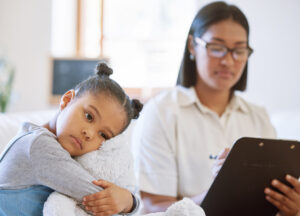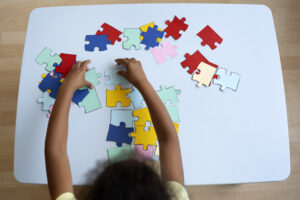Autism Symptoms
Autism, or autism spectrum disorder as it is more correctly known, is a neurodevelopmental disorder that mainly affects an individual’s social, emotional, and communication skills. Autism spectrum disorder symptoms can range from mild to severe, depending on where on the spectrum an individual falls.
While there are many commonly recognized autism symptoms, it is important to know that these can look different between individuals – and can often look very different in boys and girls. In some individuals these symptoms are noticeable early in infancy, in others they may not be noticed or identified until later in childhood, or even in adulthood.
Understanding more about the early signs of autism can ensure faster intervention, diagnosis, and support.
With this in mind, the following symptoms make up our autism spectrum disorder checklist:
- Does your child prefer solitary or solo play?
- Is your child reluctant to play with others, including close family members or caregivers?
- Does your child resist physical contact, even with close family members or caregivers?
- Does your child display delayed speech, including a limited vocabulary and inability to use words for communication?
- Is your child reluctant or unable to initiate, engage in, and maintain conversation with others, including with close family members or caregivers?
- Does your child repeatedly ignore, be oblivious to, or misunderstand social cues?
- Does your child make repetitive movements and tics?
- Is your child insistent about sticking to rigid routines and rituals?
- Does your child display discomfort, or a more serious response, to small changes in routine?
- Does your child display any issues with coordination, with regards to their physical movements and ability?
- Is your child sensitive to sensory stimuli and experiences?
- Does your child show no interest in imaginative play?
- Does your child show an intense interest in specific topics, themes, activities, or objects?
If you find yourself agreeing with at least 25% of the above symptoms, you may want to consider consulting a medical professional about your child’s development. They may not be indicative of autism spectrum disorder, but as early intervention is key, it is important to address any concerns you may have with a professional.
In some cases, an autism spectrum disorder diagnosis may also lead to a rare disease diagnosis, based on the presence of additional symptoms, or family medical history.
Recognizing Autism Spectrum Disorder (ASD) symptoms early is key to getting timely support. FDNA’s free, secured AI Child Development Checker helps you evaluate your child’s development at home, offering insights and expert connections. Start using it to better understand and meet your child’s unique needs.



